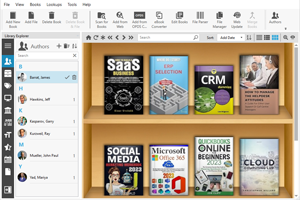4 books on Construction Software [PDF]
Updated: January 08, 2024 | 17 |
Books on Construction Software are indispensable resources for Construction Software startups, offering comprehensive insights and strategic guidance in the ever-evolving field of construction project management and technology. These resources provide a deep understanding of construction software technologies, project scheduling, and best practices, equipping startups with the knowledge and expertise needed to develop efficient, user-friendly construction software solutions. They delve into critical aspects such as document management, cost estimating, and collaboration tools, enabling startups to create platforms that assist construction firms and professionals in streamlining projects, reducing costs, and ensuring compliance with regulations. Furthermore, these books often explore emerging trends like BIM (Building Information Modeling) and IoT (Internet of Things) integration, ensuring startups remain innovative and competitive in the dynamic construction software landscape.
1. The Construction Technology Handbook
2021 by Hugh Seaton

Fed up with software that seems ineffective in the field? Eager to enhance your teams' proficiency with the latest tools? "The Construction Technology Handbook" offers a clear, jargon-free examination of technology in the construction industry. This book provides easily comprehensible explanations of how popular software functions and offers insights into efficiently implementing new tools for both large and small construction companies. It empowers construction field teams, firm owners, managers, leaders, and employees to embrace innovative ways of conducting business. Covering simple frameworks for navigating new options, understanding the workings of software and data, and exploring the benefits of artificial intelligence, the book equips readers with valuable knowledge. Additionally, it introduces upcoming tools that will eventually simplify job tasks. Packed with practical resources, this handbook guides readers in fostering an innovative and technology-friendly mindset in the workplace. Tailored for general contractors, subcontractors, construction technology vendors, and construction workers seeking deeper insights into the industry's needs and the intricacies of construction technology, this handbook is an essential addition to any professional's library.
Download PDF
2. Introduction to Construction Contract Management
2016 by Brian Greenhalgh

"This book serves as an introductory guide to construction contract administration and management, focusing on the delivery and execution phase of construction projects and addressing the myriad issues that demand proactive management by the contract administrator. Positioned as a resource for contract administrators, it outlines essential tasks and their rationale to maintain the commercial and contractual trajectory of a construction project. While it is particularly suitable for students and novice practitioners across various construction professions, its relevance extends to international projects, offering insights for those navigating different terminologies, procedures, and legal systems outside the UK. Organized into four parts, the content aligns with the timeline of a project during the construction stage, covering initiation, management, finalization, and addressing claims and disputes. 'Introduction to Construction Contract Management' is a valuable resource for students enrolled in global construction programs, international distance learners, and non-cognate graduates embarking on an international career in construction contract administration and quantity surveying."
Download PDF
3. Software Essentials: Design and Construction
2014 by Adair Dingle

"Software Essentials: Design and Construction" is a comprehensive exploration of the fundamental elements crucial to software design and construction, offering explicit definitions and illustrations. The book emphasizes the importance of understanding control flow, abstract data types (ADTs), memory, type relationships, and dynamic behavior in software development. It delves into the intricate aspects of software design, evaluating the benefits and potential overhead of object-oriented design (OOD) and analyzing various design options. With a structured yet hands-on approach, the book delineates the malleable and stable characteristics of software design and provides guidance on evaluating the short- and long-term costs and benefits of design decisions. The text also compares and contrasts design solutions, covering key topics such as polymorphism and overloading. While examples are predominantly given in C# and/or C++, focusing on design rather than syntax, "Software Essentials: Design and Construction" serves as a valuable resource for software developers seeking to navigate the complexities of software longevity, security, and efficiency.
Download PDF
4. 21St Century Technologies for Construction Industry
2013 by Bassey Effanga Asuquo

"21st Century Technologies for the Construction Industry" is an enlightening exploration of the contemporary applications of technology within the construction sector. This book is indispensable for individuals engaged in construction projects, be it in practical execution or educational pursuits. Moreover, it holds significant relevance for governments aiming to fortify their budgets and alleviate poverty within their populations. Beyond its informative and educational aspects, the book provides actionable procedures that can be implemented. Authored by Kayesh Technologies, an IT firm based in Nigeria with global partnerships, the book not only reveals the transformative potential of modern technology but also offers the means to surpass goals beyond imagination. For further assistance, interested individuals can explore the offerings of Kayesh Technologies at www.kayeshtech.com.
Download PDF
How to download PDF:
1. Install Google Books Downloader
2. Enter Book ID to the search box and press Enter
3. Click "Download Book" icon and select PDF*
* - note that for yellow books only preview pages are downloaded
1. The Construction Technology Handbook
2021 by Hugh Seaton

Fed up with software that seems ineffective in the field? Eager to enhance your teams' proficiency with the latest tools? "The Construction Technology Handbook" offers a clear, jargon-free examination of technology in the construction industry. This book provides easily comprehensible explanations of how popular software functions and offers insights into efficiently implementing new tools for both large and small construction companies. It empowers construction field teams, firm owners, managers, leaders, and employees to embrace innovative ways of conducting business. Covering simple frameworks for navigating new options, understanding the workings of software and data, and exploring the benefits of artificial intelligence, the book equips readers with valuable knowledge. Additionally, it introduces upcoming tools that will eventually simplify job tasks. Packed with practical resources, this handbook guides readers in fostering an innovative and technology-friendly mindset in the workplace. Tailored for general contractors, subcontractors, construction technology vendors, and construction workers seeking deeper insights into the industry's needs and the intricacies of construction technology, this handbook is an essential addition to any professional's library.
Download PDF
2. Introduction to Construction Contract Management
2016 by Brian Greenhalgh

"This book serves as an introductory guide to construction contract administration and management, focusing on the delivery and execution phase of construction projects and addressing the myriad issues that demand proactive management by the contract administrator. Positioned as a resource for contract administrators, it outlines essential tasks and their rationale to maintain the commercial and contractual trajectory of a construction project. While it is particularly suitable for students and novice practitioners across various construction professions, its relevance extends to international projects, offering insights for those navigating different terminologies, procedures, and legal systems outside the UK. Organized into four parts, the content aligns with the timeline of a project during the construction stage, covering initiation, management, finalization, and addressing claims and disputes. 'Introduction to Construction Contract Management' is a valuable resource for students enrolled in global construction programs, international distance learners, and non-cognate graduates embarking on an international career in construction contract administration and quantity surveying."
Download PDF
3. Software Essentials: Design and Construction
2014 by Adair Dingle

"Software Essentials: Design and Construction" is a comprehensive exploration of the fundamental elements crucial to software design and construction, offering explicit definitions and illustrations. The book emphasizes the importance of understanding control flow, abstract data types (ADTs), memory, type relationships, and dynamic behavior in software development. It delves into the intricate aspects of software design, evaluating the benefits and potential overhead of object-oriented design (OOD) and analyzing various design options. With a structured yet hands-on approach, the book delineates the malleable and stable characteristics of software design and provides guidance on evaluating the short- and long-term costs and benefits of design decisions. The text also compares and contrasts design solutions, covering key topics such as polymorphism and overloading. While examples are predominantly given in C# and/or C++, focusing on design rather than syntax, "Software Essentials: Design and Construction" serves as a valuable resource for software developers seeking to navigate the complexities of software longevity, security, and efficiency.
Download PDF
4. 21St Century Technologies for Construction Industry
2013 by Bassey Effanga Asuquo

"21st Century Technologies for the Construction Industry" is an enlightening exploration of the contemporary applications of technology within the construction sector. This book is indispensable for individuals engaged in construction projects, be it in practical execution or educational pursuits. Moreover, it holds significant relevance for governments aiming to fortify their budgets and alleviate poverty within their populations. Beyond its informative and educational aspects, the book provides actionable procedures that can be implemented. Authored by Kayesh Technologies, an IT firm based in Nigeria with global partnerships, the book not only reveals the transformative potential of modern technology but also offers the means to surpass goals beyond imagination. For further assistance, interested individuals can explore the offerings of Kayesh Technologies at www.kayeshtech.com.
Download PDF
How to download PDF:
1. Install Google Books Downloader
2. Enter Book ID to the search box and press Enter
3. Click "Download Book" icon and select PDF*
* - note that for yellow books only preview pages are downloaded


